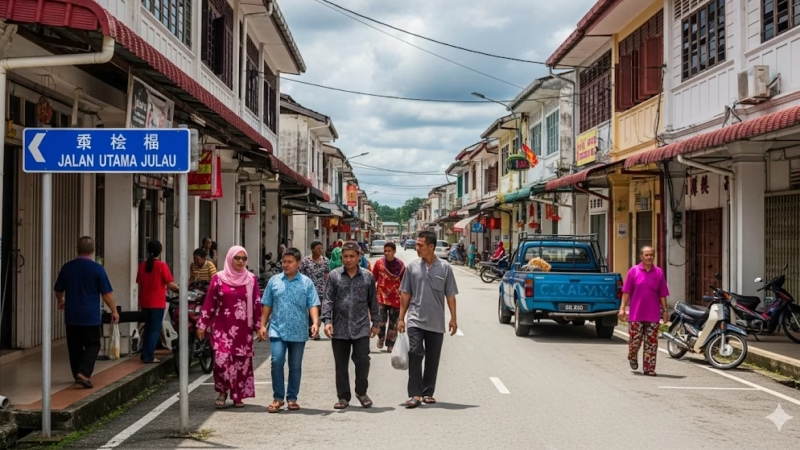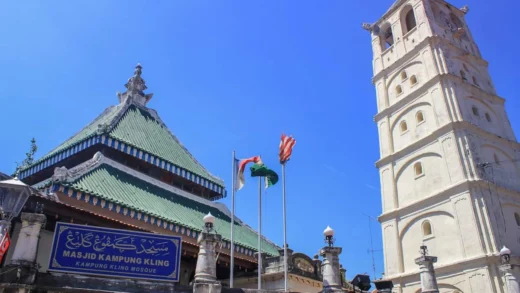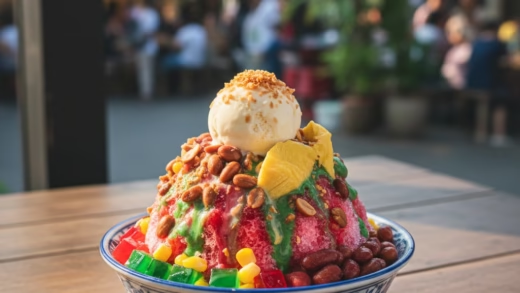Julau

Tucked away in the heart of Sarawak, Malaysia, Julau is a tranquil town that offers a rich blend of indigenous heritage, lush landscapes, and a deep-rooted connection to the spice trade. Often overshadowed by its more famous neighbors, Julau is a destination waiting to be explored by travelers seeking an authentic Malaysian experience.
Location & Accessibility
Julau is situated in the Sarikei Division of Sarawak, approximately:
The town lies at the confluence of the Kanowit and Julau rivers, making it a strategic location for river-based transportation. Julau is accessible by road, while many remote areas rely on boats for travel. The nearest major airport is in Sibu, which connects to Kuala Lumpur and other Malaysian cities.
History & Background
Julau’s history is deeply intertwined with the indigenous Iban community and Chinese Fuzhou settlers. The town’s name, “Julau,” is believed to be derived from the Iban language. Under the Brooke administration, the region was developed for agriculture, with black pepper cultivation becoming a significant economic activity. Today, Julau is renowned as the “Black Pepper District” of Sarawak, reflecting its agricultural heritage. In 1973, Julau was officially upgraded to a district under Sarikei Division administration.
Local Lifestyle & Culture
Julau is a harmonious blend of traditional Iban customs and Chinese Fuzhou influences. The Iban community is known for its longhouse dwellings, intricate beadwork, and vibrant Gawai Dayak festival, which celebrates the rice harvest. The Chinese Fuzhou community contributes to the town’s culinary diversity and cultural festivals. The weekly Sunday market is a lively hub where locals sell agricultural produce, crafts, and spices, reflecting the town’s communal spirit.
Attractions & Things to Do
1. Fort Brooke (Kubu Brooke Nanga Meluan)
Located 24 km from Julau Town, this historical fort was built by the Brooke government to defend against Iban uprisings and now stands as a symbol of Sarawak’s colonial past.
2. Julau Sunday Market
A must-visit for travelers who want to experience local life. The market offers fresh produce, spices, and handmade crafts.
3. River Cruises
Explore the Julau and Kanowit rivers by boat, offering a unique perspective of the town’s lush landscapes and traditional settlements.
4. Black Pepper Farms
Visit local farms to learn about the cultivation and processing of black pepper, one of the region’s key economic activities.
5. Cultural Tours
Engage with the Iban community to learn about their traditions, crafts, and way of life.
Food & Local Cuisine
Julau’s culinary scene is a delightful mix of Iban and Chinese Fuzhou flavors. Must-try dishes include:
- Ikan Terubok Masin: Salted fish, a local delicacy.
- Ayam Pansuh: Chicken cooked in bamboo with herbs.
- Fuzhou-style Noodles: A Chinese noodle dish with a unique twist.
- Mee Baong: Catfish noodle soup, a local specialty.
Local eateries and the Sunday market are ideal places to sample these authentic dishes.
Accommodation Options
While Julau has limited accommodation options, nearby towns like Sibu provide a range of choices:
- Budget: Hostels and guesthouses in Sibu.
- Mid-range: Comfortable 3-star hotels.
- Luxury: 4 to 5-star hotels with premium amenities.
Booking in advance is recommended, especially during peak travel seasons.
Shopping & Souvenirs
The Julau Sunday Market is the best place to pick up local products:
- Black Pepper: Freshly harvested and ground.
- Handmade Crafts: Traditional Iban beadwork and woven items.
- Local Produce: Fresh fruits, vegetables, and herbs.
These items make for authentic souvenirs and support local artisans.
Nearby Places to Visit
- Sibu: Known for its riverfront, markets, and Chinese temples.
- Kanowit: Offers cultural experiences with the Iban community.
- Bako National Park: A nature lover’s haven with diverse ecosystems.
Travel Tips
- Best Time to Visit: March to October, avoiding the monsoon season.
- Safety: Julau is generally safe, but exercise caution in unfamiliar areas.
- Transport: Public buses and private vehicles are available.
- Cultural Etiquette: Respect local customs, especially when visiting longhouses.
Why Visit
Julau offers a unique blend of cultural heritage, natural beauty, and authentic experiences. From exploring historical sites and savoring local cuisine to engaging with the community, Julau provides a refreshing escape from the usual tourist trail. Its rich traditions, scenic landscapes, and warm hospitality make it a destination worth exploring for travelers seeking an off-the-beaten-path experience in Sarawak.














Comments are closed.